The 2025 Alzheimer’s Association International Conference (AAIC), held in Toronto, Canada, from July 27-31, gathered the world’s leading researchers and clinicians on Alzheimer’s disease and related dementias. This year’s conference highlighted significant advancements across diagnostics, therapeutics, prevention strategies, and fundamental disease mechanisms—reinforcing the multifaceted nature of dementia research. The presentations underscored a growing emphasis on precision medicine, early detection, and the interplay of genetic, environmental, and lifestyle factors in cognitive decline.
Advances in Prevention and Lifestyle Interventions: The U.S. POINTER Study

A cornerstone of AAIC 2025 was the highly anticipated presentation of the full results from the U.S. Study to Protect Brain Health Through Lifestyle Intervention to Reduce Risk (U.S. POINTER). This two-year, multi-site randomized clinical trial enrolled over 2,000 older adults at increased risk for cognitive decline due to factors such as poor diet, sedentary lifestyle, family history of cognitive impairment, or cardiovascular risk factors. The study rigorously compared two multi-domain lifestyle interventions, including a structured program and a self-guided program.
Both interventions focused on four key areas: physical activity, nutrition (adherence to the MIND diet – Mediterranean-DASH Intervention for Neurodegenerative Delay), cognitive and social engagement (including computer-based brain training), and health monitoring (e.g., blood pressure, weight, lab results). The crucial difference between the interventions lay in the intensity, structure, accountability, and support provided.
The results showed that while both programs led to improvements in global cognitive function, the structured intervention group experienced significantly greater cognitive benefits compared to the self-guided group. Importantly, these improvements were consistent across diverse demographics, including age, sex, ethnicity, APOE-e4 genetic risk status, and heart health status—highlighting the broad applicability of the findings. The self-guided group also showed some cognitive improvement, suggesting that less intensive lifestyle changes can also be beneficial. However, the superior outcomes in the structured group underscore the power of consistent support and a tailored approach in promoting brain health.
The U.S. POINTER study provides compelling evidence that lifestyle interventions can play a vital role in protecting cognitive function and increasing resilience against age-related cognitive decline. The findings, published in The Journal of the American Medical Association (JAMA), pave the way for future research exploring the combination of lifestyle programs with pharmacological treatments as the next frontier in the fight against cognitive decline and dementia. An extension of the study, the U.S. POINTER Alumni Extension, will continue to observe participants for an additional four years to assess longer-term impacts.
The Rainwater Charitable Foundation Booth: A Hub of Tauopathy Research and Collaboration
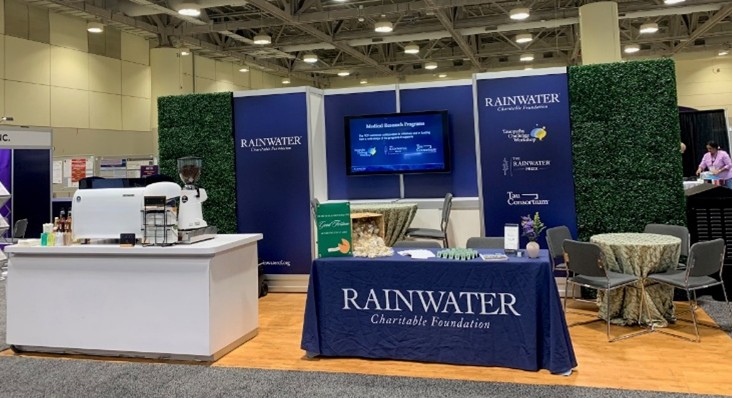
For the second year in a row, the RCF hosted a booth on the exhibition floor that served as a hub for interested researchers and partners to connect and learn more about primary tauopathies. In addition to promoting The Rainwater Prize Program and the Tau Consortium, many in attendance were drawn to learn more about applying to the 2026 Tauopathy Challenge Workshop—which focuses on bioanalytical and biophysical approaches to study the tau protein with applications due September 2.
Additionally, the RCF booth served as a venue for our partners, CurePSP and the 10,000 Brains Project, to discuss their new open funding calls. CurePSP announced the opening of their Pathway and Pipeline grant program, which provides vital seed funding—up to $100,000 for one- or two-year studies—to early-career investigators with innovative ideas. The program is divided into two key areas: “pathway” grants and “pipeline” grants. Pathway grants support fundamental neurobiology research into Progressive Supranuclear Palsy (PSP) and Corticobasal degeneration (CBD), aiming to deepen the understanding of underlying basic science, biochemical, or molecular mechanisms. Pipeline grants focus on translational projects, accelerating the development of new therapeutics and biomarkers for PSP and CBD.
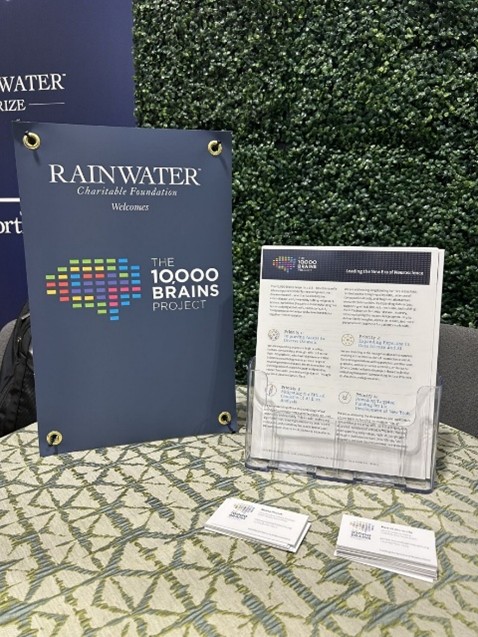
The 10,000 Brains Project is a US-based non-profit initiative dedicated to accelerating the ethical use of artificial intelligence (AI) in the fight against neurodegenerative diseases. Their mission is to advance targeted therapies and personalized care for millions affected globally. Path-ND, their flagship initiative, is a digital brain banking program aiming to digitize ultra-high-resolution images from up to 10,000 patient brain tissue samples. This vast dataset, including cases of Alzheimer’s, Parkinson’s, and Frontotemporal dementia (FTD), will be freely shared with the global research community. By leveraging AI and big data analytics, the project seeks to uncover new insights, identify novel biomarkers, and facilitate more precise diagnostics and treatments—ultimately transforming neurodegenerative diseases from life-altering conditions into manageable ones. The project also focuses on improving data quality, training an interdisciplinary workforce, and developing ethical standards for AI in neuroscience.
Visiting Friends and Colleagues from Across the Globe
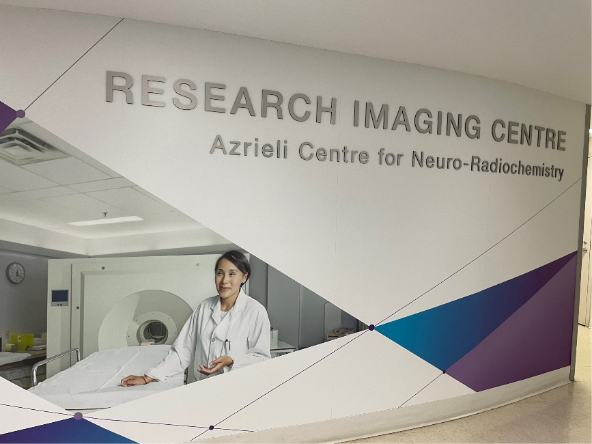
While in Toronto, the RCF staff visited the Center for Addiction and Mental Health (CAMH) Brain Health Imaging Center where Tau Consortium investigator Neil Vasdev, PhD runs the Azrieli Centre for Neuro-Radiochemistry.
The Center was established in 1992 and is home to the first two cyclotrons in Toronto and has 17 “hot” cells, or heavily shielded enclosures used in radiochemistry to safely handle and manipulate radioactive materials.
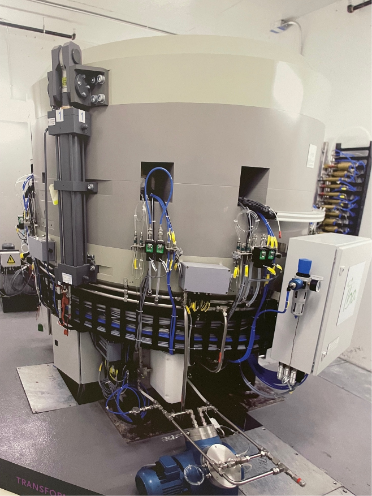
This was a wonderful opportunity to attend the site where the OXD-2314 clinical trial was launched last year. The team learned that including the OXD-2314 PET ligand, the Center has synthesized and run 42 PET radiopharmaceuticals for human brain imaging studies. It was an incredible setting to meet with other partners, researchers, and clinicians who have been involved in the successful launch of the trial.
Through our strategic partnerships and funding, the Rainwater Charitable Foundation continues to play a vital role in advancing the understanding and treatment of primary tauopathies. Our presence and the achievements of our supported researchers at AAIC 2025 reinforce our commitment to filling critical research gaps and accelerating the development of effective therapies for neurodegenerative diseases.

To learn more about our funding in medical research, visit our website here.
